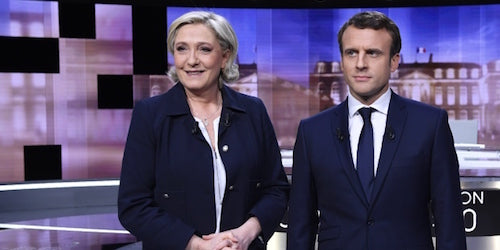Let's Now Make Sure the Fight Continues


A huge win for Emmanuel Macron on 65.1% and a bit of a slap in the face for the Front National, who failed to hegemonise either the Right or the so-called "anti-neoliberal" vote. These, indeed, are not united constituencies. There seems to have been a relatively poor turnout (5% or so lower than usual) plus about four million spoilt ballots, historic in the French context or indeed any advanced democracy.
With Macron’s victory, Geert Wilders’ ultimately poor result in the Dutch election, the likely SPD or CDU win in the German election this autumn and the apparent collapse of UKIP in the run up to 8 June, I think it likely a narrative will take hold that the “revolt” of 2016 is now being undone by a series of centrist victories, restoring things to “normal” after the wobble of recent months.
Perhaps some voters are now being mobilised after their shock at the Trump or Brexit victories. Nonetheless, such a narrative seems highly complacent given the total lack of answers to the crisis of the euro as a currency, or the EU as a project bereft of meaningful democratic structures. Lest we forget, the French presidential vote was an election in which the historic main parties, dominant since the 1950s, came 3rd and 5th.
Slavoj Zizek offered rare insight this week by raising the spectre of votes every five years where we all worry about the fascist threat mobilising the proles, only then to breathe a big sigh of relief when they fail to turn out and nothing changes. This is indeed now the best hope of maintaining the argument that “there is no alternative” to endless Uberisation. The likes of Macron would rather have toxic racists as their opposition, the better to rally people around their own social programme.
Indeed, the last few weeks have seen an endless campaign against the French Left, insisting that they should shut up their criticisms of Macron for the sake of maintaining the anti-fascist front. Yet Jean-Luc Mélenchon, key target of this campaign, was in fact ignored whenever he did speak out against the Front National and its fake anti-establishment posture. Ironically, it was only his failure to endorse Macron’s programme that kept his arguments for a different social model in the media spotlight.
A lot of people have said that it was necessary to vote for Macron in order to allow the space for the fight to continue. Let us now — in France as elsewhere — make sure that we do not just collapse into the hope that liberals can continue to keep the far Right at bay. This is a dangerous illusion. Marine Le Pen achieved almost double the vote her father did. The FN is still on the rise.
In 2002, with the shock breakthrough of Jean-Marie Le Pen, we saw a lot of discussion of the left-behind, the unemployed, the "forgotten" emerging on the fringes of our new and globalised world. Through their vote they shocked the system, as they did during Brexit and the 2016 presidential election. Yet that was it, once the electoral cycle was over. We never seem to arrive at any concrete conclusions for what should be done.
The answer is the mobilization for a different social model: not the last-minute call to arms, every five years, to defend the citadel from the bad and the dangerous, but the building of an alternative, over years and decades. That is no simple task: it is the overthrow of the whole cultural atmosphere of the last three decades. It is a process in which France Insoumise has made important headway, and in which June's parliamentary elections are one small step.
As Édouard Louis wrote, explaining the kind of despair in which chauvinism and Le Pen thrive, that means the hard work of organising the bad and the ugly, not just the already-enlightened. "It’s not enough to show that she is racist and dangerous: Everyone knows that already. It’s not enough to fight against hate or against her. We have to fight for the powerless, for a language that gives a place to the most invisible people."